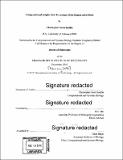Computational insights into the ecology of the human microbiota
Author(s)
Smillie, Christopher Scott
DownloadFull printable version (13.15Mb)
Other Contributors
Massachusetts Institute of Technology. Computational and Systems Biology Program.
Advisor
Eric Alm.
Terms of use
Metadata
Show full item recordAbstract
The vast community of microbes that inhabit the human body, the human microbiota, is important to human health and disease. These microbes contribute to human metabolism, the development of the immune system and pathogen resistance, while imbalances among them have been associated with several diseases. In this work, I develop computational methods to gain key insights into the ecological principles that shape these communities. In the first chapter, I develop an evolutionary rate heuristic that leads to the discovery of a massive network of recently exchanged genes, connecting diverse bacteria throughout the human microbiota. Using this network, I examine the roles of phylogenetic distance, geographic proximity and ecological overlap in shaping rates of horizontal gene transfer. Of these factors, ecological similarity is the principal force shaping gene exchange. In the second chapter, I focus on the microbial communities within a person, identifying the factors that affect the stability of the human microbiota. Alpha-diversity is strongly correlated with stability, but the direction of this correlation changes depending on the body site or subject being examined. In contrast, beta-diversity is consistently negatively correlated to stability. I show that a simple equilibrium model explains these results and accurately predicts the correlation between diversity and stability in every body site, thus reconciling these seemingly contradictory relationships into a single model. In the final chapter, I explore the use of fecal microbiota transplantation (FMT) to treat recurrent Clostridium difficile infection. I develop a new method to infer the genotypes and frequencies of bacterial strains in metagenomics samples. I apply this method to a dataset covering twenty patients before and after FMT, uncovering key ecological rules that govern the colonization and growth of bacteria in human subjects after FMT.
Description
Thesis: Ph. D., Massachusetts Institute of Technology, Computational and Systems Biology Program, February 2016. Cataloged from PDF version of thesis. Includes bibliographical references (pages 99-110).
Date issued
2016Department
Massachusetts Institute of Technology. Computational and Systems Biology ProgramPublisher
Massachusetts Institute of Technology
Keywords
Computational and Systems Biology Program.